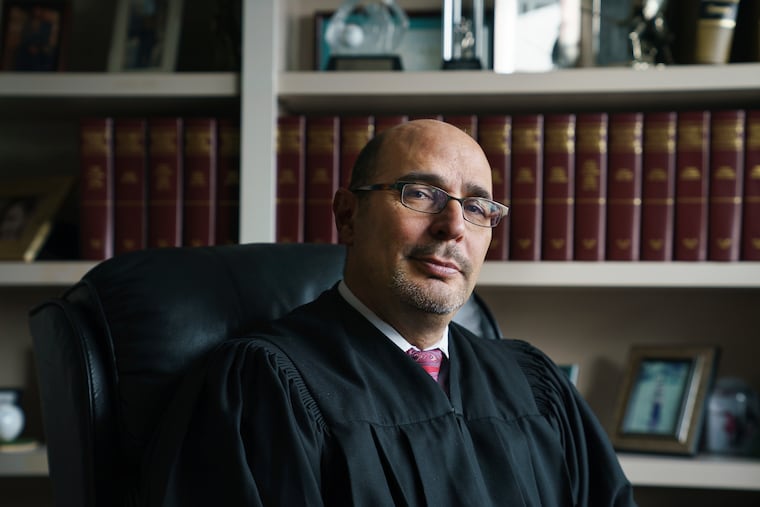Philly judge Scott DiClaudio faces disciplinary charges over legal feud with Montgomery County fitness club
Common Pleas Court Judge Scott DiClaudio spent four years ignoring attempts by the Cynwyd Club to collect money he owed, a new lawsuit says.

A Philadelphia Common Pleas Court judge spent the better part of four years ignoring attempts by a Montgomery County “fitness and socializing club” to collect thousands of dollars he owed in back dues. Now he’s facing sanctions from the state.
The Pennsylvania Judicial Conduct Board on Friday announced formal charges against Judge Scott DiClaudio for repeatedly disregarding a suburban judge’s orders in a civil case filed by the Cynwyd Club, and for failing to disclose tax liens placed on his assets by the state Department of Revenue.
He “engaged in conduct … that was so extreme, that it brings the judicial office itself into disrepute,” Richard W. Long, the board’s chief counsel, wrote in court documents.
DiClaudio did not respond to a request for comment left with his chambers Friday.
The judge has the right to respond to the charges, and to have a public trial. If the board upholds the charges, he could face a variety of sanctions, including suspension or removal from office.
If these charges are proven, it would be the fifth time that DiClaudio is punished by the conduct board. His prior run-ins led the state Supreme Court to scold him in 2016, when Justice Debra McCloskey Todd told him, “This court will not tolerate serial misconduct. Any future misconduct will result in prompt and considerable punishment.”
DiClaudio was “not recommended” by the Philadelphia Bar Association during the 2015 judicial election, during which he received an endorsement from U.S. Rep. Bob Brady.
The conduct board’s filing Friday details the Cynwyd Club’s attempt to get DiClaudio to pay them what he owes, a process that began in 2015.
After a district judge ruled in the club’s favor, ordering DiClaudio to pay nearly $4,000, the city judge filed an appeal at the county level, the filing said. And then he seemingly ignored the case: A county judge upheld the lower court’s ruling after DiClaudio failed to appear at hearings and respond to filings.
Orders from the Cynwyd Club attempting to collect the judgment were sent to DiClaudio’s office in Philadelphia, according to the conduct board filing. They were either returned or met with no response. As the process continued, Montgomery County Senior Judge Emmanuel Bertin found DiClaudio in contempt, and levied fines against him.
Finally, on Oct. 24, DiClaudio appeared in Norristown to settle the case, and agreed to pay $9,500 to the club in two payments.
As the Judicial Conduct Board investigated this case, its members found that DiClaudio repeatedly failed to disclose tax liens on his annual statements of financial interest.
The Pennsylvania Department of Revenue filed more than $300,000 in liens against DiClaudio between 2011 and 2017, according to the conduct board’s filing. It’s unclear how much of those liens remain, but the document indicates that none have been completely satisfied.
DiClaudio’s prior discipline from the state judicial board began during his career as a lawyer.
He was “informally admonished” in 2003 for failure to properly file a criminal appeal, and again in 2008 for failing to provide a client with a written fee agreement and for “making false statements.”
In April 2011, the Supreme Court placed DiClaudio on a year’s probation for bungling another client’s appeal. And he was formally censured in 2014 for representation of Ahmed Khalil, who pleaded guilty for possession of a firearm without a license in 2007 and was sentenced to four years’ probation.
DiClaudio filed an appeal of the probation violation on Khalil’s behalf, but then failed to file required paperwork related to the appeal. Superior Court dismissed the appeal and DiClaudio didn’t tell Khalil about the dismissal.
More recently, DiClaudio gained attention with his public feud with District Attorney Larry Krasner.
The judge was frustrated that the District Attorney’s Office decided to appeal a unanimous decision in October by a three-judge panel of Superior Court, which denied Krasner’s request to have DiClaudio disqualified from hearing criminal cases because the judge’s girlfriend, a former city prosecutor, had filed a racial-discrimination complaint against the District Attorney’s Office.